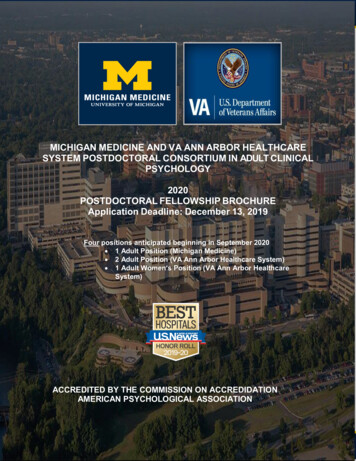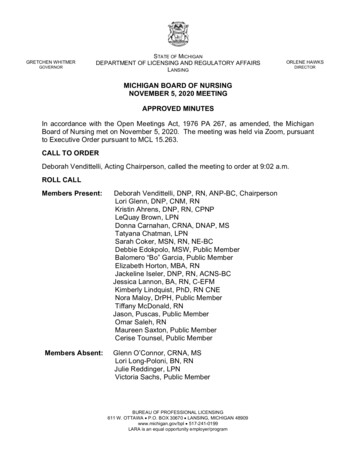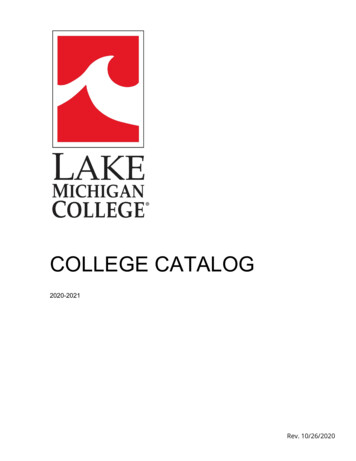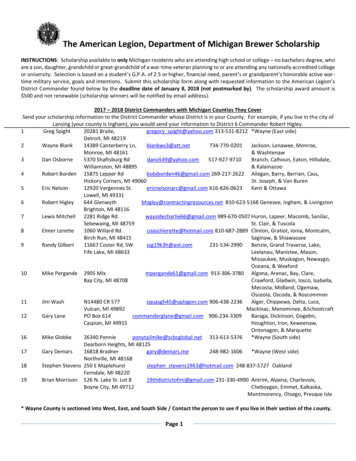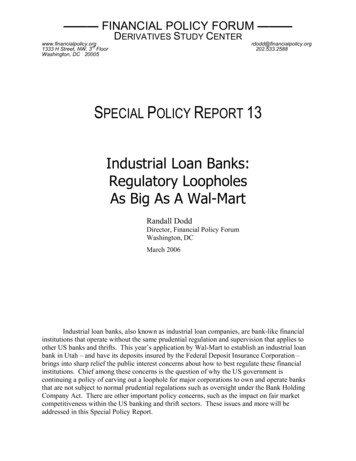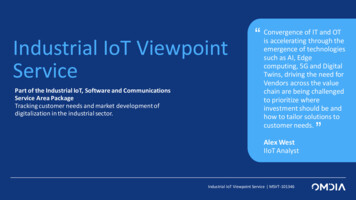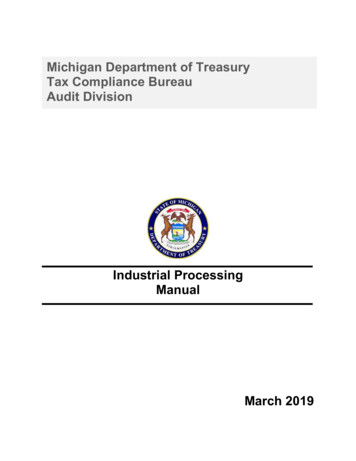
Transcription
Michigan Department of TreasuryTax Compliance BureauAudit DivisionIndustrial ProcessingManualMarch 2019
DisclosureThis manual is not intended as a statement of law, Department policy, or of theTreasurer’s official position. The information contained in this manual has beenprepared as instructional text. The purpose of this manual is to explain key provisionsof the General Sales Tax Act (GSTA) and Use Tax Act (UTA).Any references in this manual to Rules, Revenue Administrative Bulletins (RABs),Internal Policy Directives (IPDs) and Letter Rulings (LR) are based on the most recentversions available as of the date of this edition. The materials will be reviewed regularlyand revised as needed. Where changes in the law supersede and conflict with anythingin this document then the new law shall control.Michigan Department of TreasuryTax Compliance BureauUpdated March 2019Page 2 of 98
Table of ContentsChapter 1 – Introduction and Overview . 7Chapter 2 – Activities of Processors that May Not Qualify for Exemption . 13Chapter 3 – Industrial Processing Beginning and End . 15Chapter 4 – Cement Trucks . 16Chapter 5 – Computer Software Manufacturing . 17Chapter 6 – Computer Studies . 18Taxability Chart - Computer Functions for Industrial Processors . 20Chapter 7 – Computers Used in Industrial Processing by Servicers . 23Chapter 8 – Delivery – Just in Time . 25Chapter 9 – Direct Pay . 28Chapter 10 – Electrical Distribution Systems Apportionment of the Industrial ProcessingExemption for Electric Delivery . 31Chapter 11 – Grain Elevators . 37Chapter 12 – Inventory Withdrawals/Consumed Goods. 38Michigan Withdrawals . 38Non-Michigan Withdrawals . 39Chapter 13 – Material Handling . 42Michigan Department of TreasuryTax Compliance BureauUpdated March 2019Page 3 of 98
Chapter 14 – Miscellaneous . 45Chapter 15 – Packaging Tools and Equipment . 47Chapter 16 – Packaging Function . 49Chapter 17 – Packaging Materials . 50Dunnage . 50Chapter 18 – Percentage Application . 52Chapter 19 – Policy (Or Goodwill) Adjustment . 53Taxability of Parts Replaced Under Policy (or Goodwill) Adjustment . 53Chapter 20 – Printers . 54Printing Service. 54Chapter 21 – Prototypes . 55Chapter 22 – Quality Control / Research or Experimental / Engineering. 56Research or Experimental . 56Quality Control . 57Engineering . 57Chapter 23 – Real vs. Personal Property . 58Annexation to Realty, either Actual or Constructive . 58Adaptation or Application to the Use or Purpose of the Real Estate . 59Intention to make the Article a Permanent Accession to the Real Estate . 59Manufacturer/Contractor . 59Taxability Chart – Real vs. Personal Property Tax Status for Industrial Processors. 60Michigan Department of TreasuryTax Compliance BureauUpdated March 2019Page 4 of 98
Chapter 24 – Reconditioning / Remanufacturing . 68Chapter 25 – Refrigeration & Freezers. 69Chapter 26 – Repackaging. 70Chapter 27 – Retail Preparation of Food . 71Chapter 28 – Retailers and the Industrial Processing Exemption . 72Chapter 29 – Scrap Dealers & Recyclers . 74Roll-offs (Dumpsters) . 74Hoppers . 74Freon Recovery Machines . 74Loading and Unloading Equipment . 75Sorting Equipment Such as Cranes, Loaders, and Lift Trucks . 75Equipment Used to Cut, Break, and Crush (After Disassembly) . 75Paper Shredding Equipment. 75Banding and Baling Equipment . 75Chapter 30 – Servicers. 76Chapter 31 –Storage Tanks and Mixing Tanks . 77Gas Cylinders . 77Chapter 32 – Stores Accounts (Non-Production Inventory). 78Taxability of Items – When Used in Exempt Production Areas – No Shipping,Receiving, etc. . 79Chapter 33 – Taxidermists . 84Michigan Department of TreasuryTax Compliance BureauUpdated March 2019Page 5 of 98
Chapter 34 – Utilities . 85Heating and Cooling . 85Idle Time . 85Taxability of Areas for Utility Studies . 88Chapter 35 – Waste Removal / Pollution Control Facilities . 89Piping of Waste to another Location . 89Air and Water Pollution Controls . 91Environmental Clean Up . 92Index of References . 93Michigan Department of TreasuryTax Compliance BureauUpdated March 2019Page 6 of 98
Chapter 1 – Introduction and OverviewThe State of Michigan allows an industrial processing (IP) exemption from sales anduse tax. The industrial processing exemption is limited to specific property andactivities.The GSTA and UTA generally define industrial processing as “the activity ofconverting or conditioning tangible personal property by changing the form,composition, quality, combination, or character of the property for ultimate sale at retailor for use in the manufacturing of a product to be ultimately sold at retail. Industrialprocessing begins when tangible personal property begins movement from rawmaterials storage to begin industrial processing and ends when finished goods firstcome to rest in finished goods inventory storage.” Under the UTA, “industrialprocessing” also includes the activity of converting or conditioning tangible personalproperty by changing the form, composition, quality, combination, or character ofproperty that is ultimately “affixed to and made a structural part of real estate located inanother state.”The GSTA and UTA generally define an industrial processor as “a person whoperforms the activity of converting or conditioning tangible personal property for ultimatesale at retail or use in the manufacturing of a product to be ultimately sold at retail.”Under the UTA, an “industrial processor” also includes a person who performs theactivity of converting or conditioning tangible personal property that will ultimately be“affixed to and made a structural part of real estate located in another state.”Additionally, the Department’s sales/use tax rule explains that “the consumption or useof the tangible personal property rather than the kind or character of the property sold isthe determining factor as to whether or not such a sale is taxable.” Moreover, todetermine whether the IP exemption applies, it is necessary to consider the activity inwhich the equipment is engaged and not the character of the equipment-owner'sbusiness.The exemption applies to sales to: An industrial processor for use or consumption in industrial processing. A person, even if the person is not an industrial processor, if the tangiblepersonal property is intended for ultimate use in and is used in industrialprocessing.Example 1:Parent Corp. is a California-based distributor of automobiles. It does no actualmanufacturing itself as all production is farmed out to Subsidiary Corp., a whollyowned subsidiary located in Detroit, Michigan. Parent Corp. has purchased diesfor 10,000,000 that will be used by Subsidiary Corp. in the actual manufacturingMichigan Department of TreasuryTax Compliance BureauUpdated March 2019Page 7 of 98
of automobiles. Is Parent Corp. liable for sales or use tax on the purchase of thedies delivered to it in Michigan?Answer:No. The dies are exempt because they are used by an industrial processor(Subsidiary Corp.) in an industrial processing activity. A person, even if the person is not an industrial processor, if the tangiblepersonal property is used by that person to perform an industrial processingactivity for or on behalf of an industrial processor. A person, even if the person is not an industrial processor, if the tangiblepersonal property is one of the following: A computer used in operating industrial processing equipment. Equipment used in a computer assisted manufacturing system. Equipment used in a computer assisted design or engineering systemintegral to an industrial process. A subunit or electronic assembly comprising a component in a computerintegrated industrial processing system. Computer equipment used in connection with the computer assistedproduction, storage, and transmission of data if the equipment would havebeen exempt had the data transfer been made using tapes, disks, CDROMs, or similar media by a company whose business includespublishing doctoral dissertations and information archiving, and that sellsthe majority of the company’s products to nonprofit organizations exemptunder section 4q of the GSTA or section 4(1)(w) of the UTA. Equipment used in the production of prewritten computer software orsoftware modified or adapted to the user’s needs or equipment by theseller (if the software is available for sale from a seller of software on anas-is basis or as an end product without modification or adaption).Common and statutory meaning of certain industrial processing terms: Convert or Condition: To change the form, composition, quality, combination,or character of property Quality: The essential character of somethingMichigan Department of TreasuryTax Compliance BureauUpdated March 2019Page 8 of 98
Combination: Something resulting from the combining of two or more things Form: The contour and structure of something as distinguished from itssubstance Composition: A putting together of parts or elements to form a whole; acombining; the manner in which such parts are combined or related; constitutionor make-up; the result or product of composing or mixture; compound Character: The combination of qualities or features that distinguishes one thingfrom another Product: As used in the context of research or experimental activity, meansprototype, pilot model, process, formula, invention, technique, patent, or similarproperty, whether intended to be used in a business or to be sold, transferred,leased or licensed Remanufacturing: The activity of overhauling, retrofitting, fabricating, orrepairing a product or its component parts for ultimate sale at retail Research or experimental activity: Activity incident to the development,discovery, or modification of a product or a product related process. Research orexperimental activity also includes activity necessary for a product to satisfy agovernment standard or to receive government approval. Research orexperimental activity does not include the following: Ordinary testing or inspection of materials or products for quality controlpurposes. Efficiency surveys. Management surveys. Market or consumer surveys. Advertising or promotions. Research in connection with literacy, historical, or similar projects.Industrial processing includes the following activities: Production or assembly RemanufacturingMichigan Department of TreasuryTax Compliance BureauUpdated March 2019Page 9 of 98
Recycling of used material for ultimate sale at retail Research or experimental activities Engineering related to industrial processing Inspection, quality control or testing to determine whether the materials,products or processes conform to specified parameters at any time before thematerials or products first come to rest in finished goods inventory storage Planning, scheduling, supervision or control of production or other exemptactivities Design, construction, or maintenance of production or other exemptmachinery, equipment and tooling Processing of production scrap and waste up to the point it is stored forremoval from the plant of origin Production material handling Storage of in-process materialsNote: If an industrial processing activity is not occurring under either MCL205.54t(7)(a)/MCL 205.94o(7)(a) or MCL 205.54t(3)/MCL 205.94o(3), thetaxpayer is not entitled to the exemption. If, however, an industrialprocessing activity is occurring, then the remaining provisions of MCL205.54t/MCL 205.94o must be analyzed to determine the measure of theexemption.Property that qualifies for the industrial processing exemption includes: Property that becomes an ingredient or component part of the finished productthat is ultimately sold at retail or affixed to real estate located in another state Machinery, equipment, tools, dies, patterns, foundations for machinery orequipment (e.g., foundations for electricity transmission towers), or otherprocessing equipment used in an industrial processing activity and in theirrepair and maintenance Property that is consumed, destroyed or loses its identity in an industrialprocessing activity Tangible personal property, not permanently affixed and not becoming astructural part of realty that becomes a part of, or is used and consumed inMichigan Department of TreasuryTax Compliance BureauUpdated March 2019Page 10 of 98
installation and maintenance of systems used for an industrial processingactivity Fuel or energy used or consumed for an industrial process Machinery, equipment and materials used within a plant site or between plantsites of the same person for movement of tangible personal property in theprocess of production This includes front end loaders, forklifts, pettibone lifts,skidsters, multipurpose loaders, knuckle-boom log loaders, tractors, and logloaders used to unload logs from trucks at a saw mill site for the purpose ofprocessing at the site and to load lumber onto trucks at a saw mill site forpurposes of transportation from the site Office equipment or data processing equipment used for industrial processingactivitiesTangible personal property used or consumed in an industrial processing activityto produce alcoholic beverages that are sold at retail by the industrial processorthrough its own retail locations Vehicles bearing a manufacturer’s plate or vehicles specifically designed,together with parts, used to mix and agitate materials at a plant or job site inthe concrete manufacturing processThe following activities are not exempt: Purchasing, receiving or storage of raw materials Sales, distribution, warehousing, shipping, or advertising activities Administrative, accounting, or personnel services Design, engineering, construction or maintenance of real property and nonprocessing equipment Plant security, fire prevention, medical or hospital servicesThe following types of property do not qualify for the industrial processing exemption: Tangible personal property permanently affixed and becoming a structural partof real estate including building utility systems (heating, air conditioning,ventilating, plumbing, lighting, and electrical distribution) to the point of the lasttransformer, switch, valve, or other device at which point usable power, water,gas, steam, or air is diverted from distribution circuits for use in industrialprocessing.Michigan Department of TreasuryTax Compliance BureauUpdated March 2019Page 11 of 98
Note: Foundations for machinery or equipment used in industrial processing areexempt regardless whether the foundation would otherwise be consideredaffixed to real estate.Note: Under the UTA, the above disqualification does not apply to propertypermanently affixed and becoming a structural part of real estate locatedin another state. Office equipment, including data processing equipment not used for industrialprocessing purposes. All office furniture or office supplies, regardless of use. Inventory (an industrial processor’s own product or finished good) withdrawalsthat the industrial processor uses or consumes for purposes other thanindustrial processing. Tangible personal property used for receiving and storage of either (i)materials, supplies, parts, or components purchased by the user or consumer,or (ii) natural resources extracted by the user or consumer. Vehicles, including special bodies or attachments, required to display a vehiclepermit or license plate to operate on public highways (except for vehiclesbearing a manufacturer’s plate or vehicles specially designed for and used inthe concrete manufacturing process to mix and agitate materials at a plant orjobsite). Tangible personal property used for the preparation of food or beverages by aretailer for ultimate sale at retail through its own locations (except for tangiblepersonal property used or consumed in an industrial processing activity toproduce alcoholic beverages that are sold at retail by that industrial processorthrough its own retail locations). Tangible personal property used for the preservation or maintenance of afinished good once it first comes to rest in finished goods storage. Returnable shipping containers or materials, except those used within a plantsite or between plant sites operated by the same entity for movement of inprocess materials. Tangible personal property used in the production of custom softwareoriginally designed for the exclusive use and special needs of the purchaser.References pertaining to this information can be found in the index under Chapter 1Michigan Department of TreasuryTax Compliance BureauUpdated March 2019Page 12 of 98
Chapter 2 – Activities of Processors that May Not Qualify for ExemptionA person may be engaged in non-industrial processing activities in addition to itsindustrial processing activities. Many services, such as engineering, inspection, design,planning, scheduling, material handling, and research, constitute industrial processing.However, if those same services are sold or used separately from the industrialprocessing activity that portion of the service is subject to tax.The taxability of selected activities is listed below.Table 1.No.1234ActivityA printer prints on stock furnished by the customer.See the “Printers” section of this text for exceptionsA printer binds books furnished by another printer. Seethe “Printers” section of this text for exceptionsA printer binds books furnished by a non-processor.See the “Printers” section of this text for exceptionsPhotographs are returned to a photographer to color ortint the photographs and the coloring or tinting isincluded in a quoted price.TaxabilityTaxableExemptTaxableTaxable5A sign manufacturer paints signs owned by anadvertising agencyTaxable6A tire company purchases old tires and retreads themfor sale to others. See the “Reconditioning/Remanufacturing” section of this textExempt78910A tire company retreads or vulcanizes tires supplied bya trucking companyA pallet manufacturer repairs pallet owned by a soapmanufacturer that used the pallets in their in-processstorage areaA heat-treat company hardens steel to be used by anautomobile manufacturer as parts for an automobileA heat-treat company heat-treats dies owned by anautomobile manufacturer that are used in an industrialprocessing activityMichigan Department of TreasuryTax Compliance BureauUpdated March 2019Taxable (materialssold only, laborcharges billedseparately are nottaxable)ExemptExemptExemptPage 13 of 98
No.1112131415ActivityA gravel mining and crushing operation has portableequipment that crushes and refines product under fourscenarios: For other mining operations At its own pits (for resale) For contractors (not for resale) For county road commissions (not for resale)A company manufactures spiral stairways andhandrails. The stairways, etc. are custom made tospecific customer requirements and affixed to realty.The company does not maintain an inventory or pricelist or make sales at retail.A company manufactures spiral stairways andhandrails. The stairways, etc. are custom made tospecific customer requirements and sold at retail.A conveyor manufacturer has employees fabricate,assemble and install the conveyor parts at thecustomer’s (an industrial processor’s) plant for use inindustrial processingA window manufacturer maintains a price list. Themanufacturer used tools at the job site to install able (if affixed toreal estate inMichigan, exempt ifaffixed in anotherstate)ExemptExemptTaxableReferences pertaining to this information can be found in the index under Chapter 2Michigan Department of TreasuryTax Compliance BureauUpdated March 2019Page 14 of 98
Chapter 3 – Industrial Processing Beginning and EndFor determining where the industrial processing exemption begins and ends, we needto look at the statute, supporting rules and binding case law.Both the GSTA and UTA provide that “industrial processing begins when tangiblepersonal property begins movement from raw materials storage to begin industrialprocessing and ends when finished goods first come to rest in finished goodsinventory.”In general, once tangible personal property begins movement from raw materialsstorage to begin industrial processing, a qualifying activity will be eligible for theexemption. Any property used to receive or store raw materials is subject to sales oruse tax. Likewise, any property used to move materials after they have come to rest infinished goods inventory is taxable. The movement of raw material from raw materialsinventory is exempt whether it goes directly to the production machinery or to a stagingarea near the production process. The movement of the material is exempt if theproduction process drives the movement of the material from raw materials storage.Note: According to a 2018 published decision of the Court of Appeals in Tomra of NAmerica v Dep’t of Treasury, this statutory language does not restrict the possibility thatindustrial processing could occur without the step of moving raw materials from storageor when tangible personal property is never in raw materials storage. Except asotherwise noted, the Department believes that this aspect of the Tomra decision departsfrom precedent as it directly conflicts with the Michigan Supreme Court’s 2015 decisionin Detroit Edison Co v Dep’t of Treasury. 1 To the extent that there is a conflict betweenthese two decisions, that conflict has yet to be resolved by the courts.The exemption ends when the manufactured goods come to rest in finished goodsinventory. The movement to or from boxing, bagging, shrink-wrapping or otherpackaging operations is exempt if it is done before the finished goods come to rest infinished goods inventory.References pertaining to this information can be found in the index under Chapter 31 Accordingly, the Department has filed an application for leave to appeal with the Michigan SupremeCourt to challenge this (and other aspects) of the Michigan Court of Appeals’ Tomra decision.Michigan Department of TreasuryTax Compliance BureauUpdated March 2019Page 15 of 98
Chapter 4 – Cement TrucksA specially designed vehicle used to mix cement and agitate materials is eligible for anindustrial processing exemption. The material may be added at a plant or job site. Thetruck, tires and repair parts attached to the cement delivery truck body or to the mixerare exempt. This exemption is available only for a concrete manufacturer. Consumablesupplies such as gasoline, oil, antifreeze, windshield washer solvent, transmission fluid,brake fluid, etc. are subject to tax.Note: Global Positioning Systems (GPS) and after-market communicationequipment are subject to tax.Note: Boom trucks, conveyors, gravel trains and trailers, and other typesof apparatus at the job site owned by a separate company orcontractor that do not mix or agitate the product are subject to tax.If a concrete manufacturer does not make retail sales but instead consumes all theconcrete on its own jobs, it would not be entitled to an exemption for its cement trucks,equipment or supplies. If the concrete manufacturer makes retail sales in addition toconsuming concrete on its own jobs, the exemption should be apportioned.Note: Tires and repair parts used on gravel trains, trailers, etc. are noteligible for the industrial processing exemption. A repair facilityusually does work on cement trucks, loaders, highway tractors andtrailers. Invoices must show that repair parts were attached to acement mixer or truck.References pertaining to this information can be found in the index under Chapter 4Michigan Department of TreasuryTax Compliance BureauUpdated March 2019Page 16 of 98
Chapter 5 – Computer Software ManufacturingThe classification of computer software as “prewritten” or “custom” determines whetherthe act of producing the software qualifies as industrial processing.Definitions:1. Computer software means a set of coded instructions designed to cause acomputer or automatic data processing equipment to perform a task2. Prewritten computer software means computer software, including prewrittenupgrades, that is delivered by any means and that is not designed and developedby the author or other creator to the specifications of a specific purchaser [e.g.custom software]3. Custom Software is designed for the exclusive use and special needs of acustomerPrewritten Computer Software: Equipment, supplies, utilities, etc. used to produceprewritten computer software are eligible for the industrial processing exemption.Equipment, supplies, utilities, etc. used to modify prewritten computer software, whetherseparately itemized for sales tax purposes or not, are also eligible for the industrialprocessing exemption.An industrial processor cannot claim the exemption for equipment used to modify aprewritten accounting software package for its own use because the software will not beused in industrial processing and there is no ultimate sale at retail. However, equipmentused in the production of prewritten computer software that is available for ultimate saleat retail on an as-is basis without modification or adaptation qualifies for the industrialprocessing exemption.Custom Software: The sale of custom software is a tax-exempt retail sale, but theequipment, supplies, a
A computer used in operating industrial processing equipment. Equipment used in a computer assisted manufacturing system. Equipment used in a computer assisted design or engineering system integral to an industrial process. A subunit or electronic assembly comprising a component in a c
